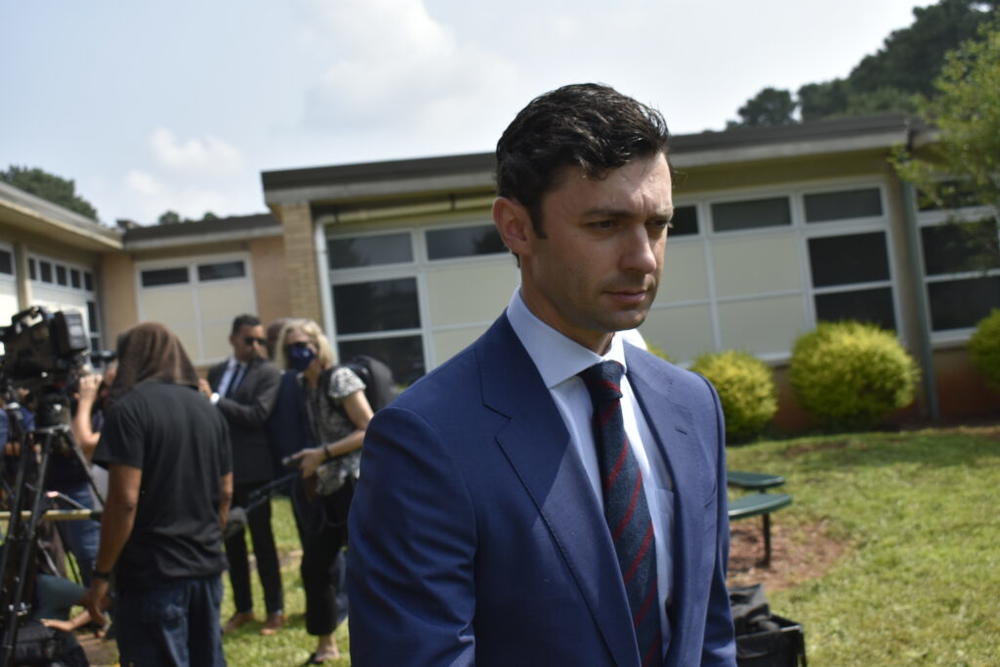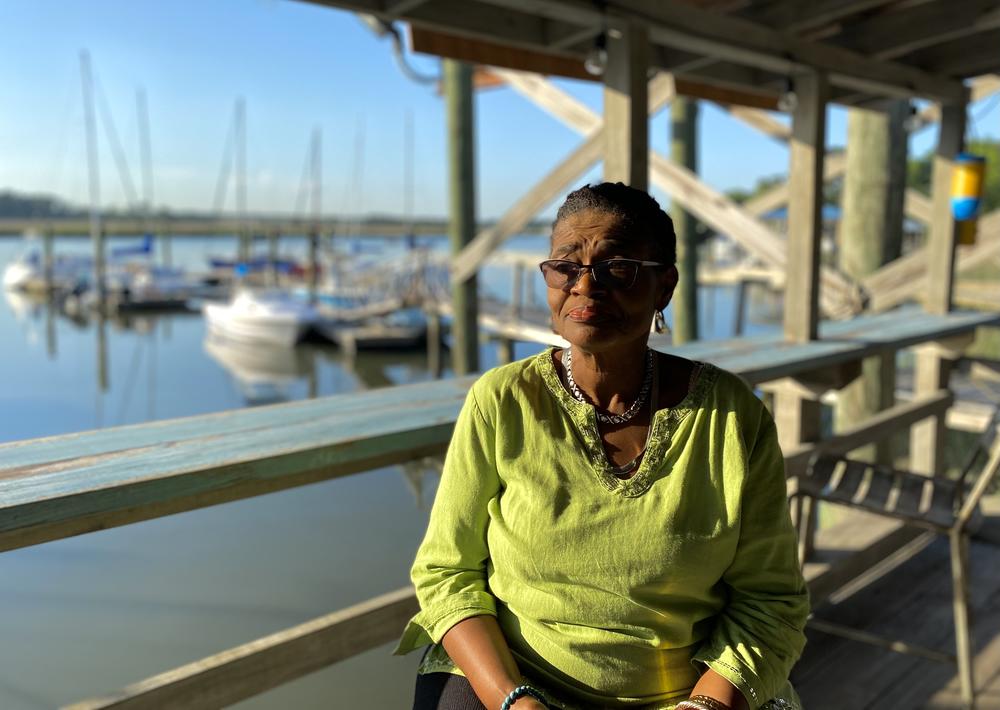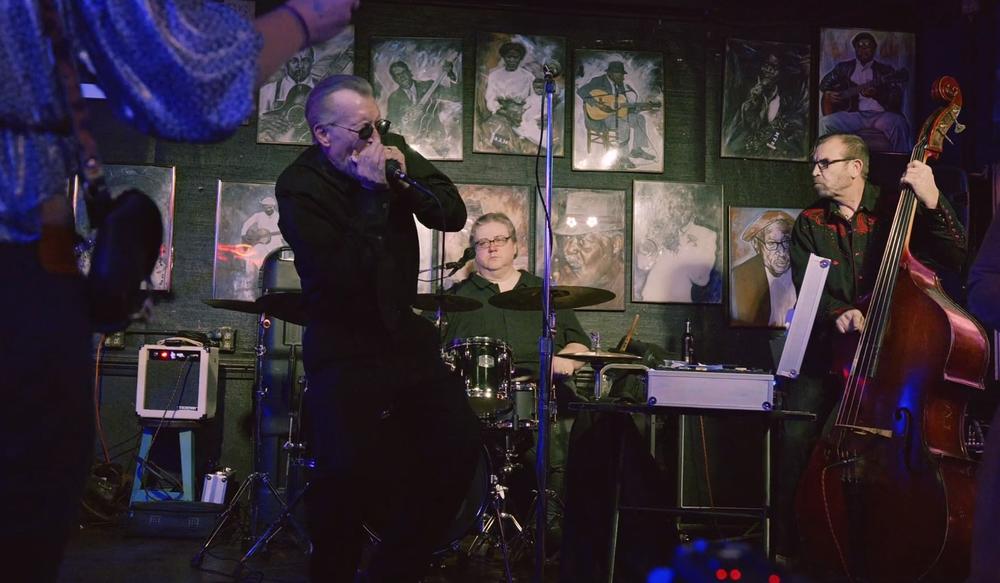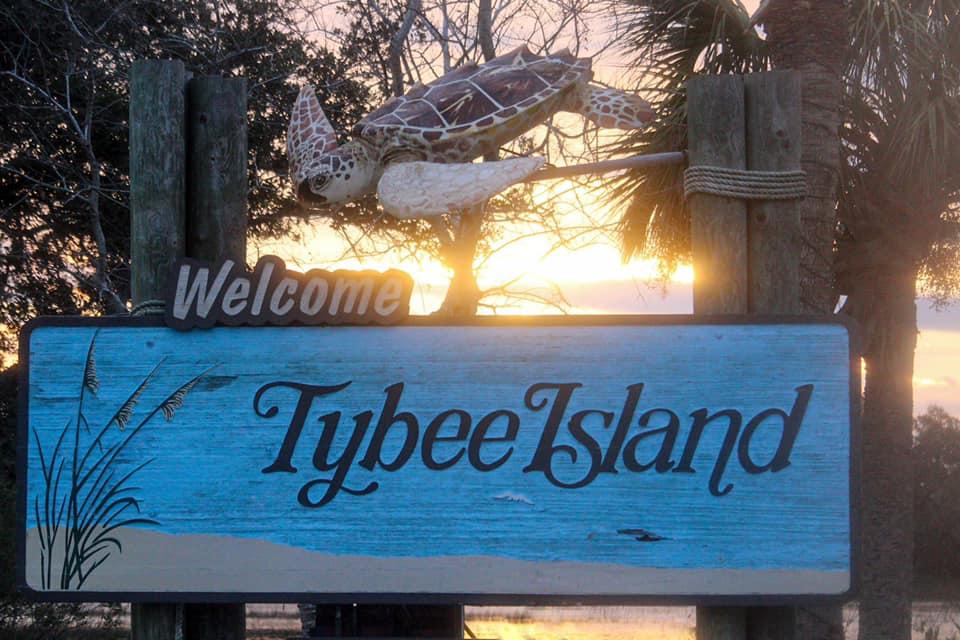
Section Branding
Header Content
Georgia Today: Federal law for Georgia improvements, new leadership, West Midtown's dive bar
Primary Content
On the Wednesday, Dec. 28 edition of Georgia Today: A new law will aid Georgia in improvements, we'll have new leadership in the state, and there's new documentary about a West Midtown dive bar.

Peter Biello: Welcome to the new Georgia Today podcast from GPB News. Today is Wednesday, Dec. 28. I'm Peter Biello. Coming up on today's episode: Improvements for the Port of Brunswick and Tybee Island have been signed into law; when lawmakers gavel in the new legislative session, there will be new leadership in both chambers; a documentary celebrates an Atlanta blues dive bar; and as we move closer to the year's end, we'll take a look back at some of our newsroom's most memorable stories that you may have missed. Today, we'll learn about the understudied subject of African-American maritime history. These stories and more are coming up on Georgia Today.

Story 1
Peter Biello: A bill that will make upgrades to the Port of Brunswick's navigation channel has been signed into law. U.S. Senator Jon Ossoff's Port of Brunswick Navigation Channel Improvement Act was included with the recently passed Water Resources and Development Act reauthorization. It aims to boost capacity at the port and help reduce supply chain bottlenecks. The port is already the second busiest for "roll on, roll off" cargo nationwide and, according to the Georgia Ports Authority, the expanded channel would permit newer ships to use the port, as well as attract more investment and create jobs. The Water Resources and Development Act reauthorization will also extend the U.S. Army Corps of Engineers' authority to partner with Tybee Island on beach renourishment and storm risk management for a dozen years. Democratic Senator Jon Ossoff had originally introduced the provisions as a standalone bill. Tybee Island has been one of the most prominent tourist destinations in the state of Georgia since the 1870s and has experienced 10 inches of sea level rise since 1935. Sen. Rev. Raphael Warnock co-sponsored the original bill.
Story 2
Peter Biello: When lawmakers gavel in the next legislative session, there will be new leadership in both chambers. GPB's Stephen Fowler has more.
Stephen Fowler: Both the House and Senate are still under Republican control, but new leadership under the Gold Dome will drive the next session's agenda. Jackson Republican Bart Jones was elected lieutenant governor and is replacing Geoff Duncan. Jones is in charge of the Senate after serving as a member beforehand. In the House, Newington Republican John Burns will take the speaker's gavel after the passing of former Speaker David Ralston last month. Along with these new leaders, expect to see shuffling among lawmakers serving as committee chairs and floor leaders who help advance the governor's agenda. This will be the first year of a two-year legislative session period, so all bills must start from scratch. For GPB News, I'm Stephen Fowler.

Story 3
Peter Biello: As we look back at some stories you may have missed in 2022, a Georgia Southern history professor says that African-American maritime history has long gone understudied. A new research project is meant to help change that. GPB's Benjamin Payne has the story.
Benjamin Payne: Jack Kronowitz is trudging through a muddy riverbank. The college senior is trying not to trip as he scans the ground for artifacts. Finally, he finds one — sort of.
Jack Kronowitz: There's a whole CD player in there — like circa 2005.
Benjamin Payne: A bygone era, to be sure, but not quite the historical period that Kronowitz and his classmates are hoping to document here on Wilmington Island.
Kurt Knoerl: So what we want to do today is document all the types of structures that are here.
Benjamin Payne: That's Kurt Knoerl, a history professor at Georgia Southern University. He's giving instructions to students in his history class who've gathered here at Young's Marina. Norell says it's one of the oldest African American-owned marinas in Georgia, if not the entire East Coast.
Kurt Knoerl: One of the things I've noticed about Savannah is that it's untapped in terms of this kind of history.
Benjamin Payne: He's referring to maritime history specifically as it pertains to the contributions of African Americans. This site visit is part of a new research project at Georgia Southern focused specifically on documenting what he says is a chronically understudied thread of history.
Kurt Knoerl: I'm a little bit like a kid in a candy store in that there's so much. I'm not sure what to do next because there are sites like this all over the area.
Benjamin Payne: Here at Young's Marina, students are mapping out what looked like abandoned railroad tracks along the water's edge. Many decades ago, they were used to lower boats into the water. Sarah Suggs wants to learn more about them. She's the owner of the marina and is looking forward to the written report that the students are preparing for her.
Sarah Suggs: It gives me an opportunity to be cautiously proud.
Benjamin Payne: Proud of the history behind the marina that her grandfather, Willie Young, built in the early 1900s, but cautious about the obstacles that she and other Black business owners still face more than 100 years later.
Sarah Suggs: If you own a Black business, it takes a lot longer to do anything. I've had projects, they've taken three-plus years. I've had people they don't know I'm Black. And once I come out that back door, I've seen people just get in their cars and leave. I've had a lot of my neighbors — they will bring their children to go down and look at the sailboats. They would never do business with us.
Benjamin Payne: Still, Suggs says that things are better now than during her childhood, when her father, Isaac Young, owned the place. Aside from Young's Marina, the research project is studying a number of maritime sites where African American history runs deep. Another one is a lock on the Savannah Ogeechee Canal that was built with enslaved labor. Looking ahead, Norrell says that the overall project has raised even more questions for future exploration.
Kurt Knoerl: So for instance, there are oyster processing places throughout the area that really haven't been explored or mapped out other than Pinpoint Heritage Museum, which is wonderful, and they do a great job of that. But that's one of many in the area. There is the boat-building tradition in Savannah that could use more study. So deciding what to do next is — it's a fun problem to have.
Benjamin Payne: Aside from archeology, other students are collecting oral histories, including at Young's Marina. Here again is Sarah Suggs, recounting a memory from her childhood of using the boat hoist, much to her father's chagrin.
Sarah Suggs: I knew how to put a boat in the hoist, and I don't think my daddy knew what I knew. So one day I put a boat in the water, hit the boat up in the air, about to go in the water. My daddy comes and he says, "Girls don't do that." And literally bumped me out of the way. So the fact that I now keep the train on the track, I know my father is in heaven looking down: "That girl did it anyway."
Benjamin Payne: Just one of many stories historians hope to document. For GPB News, I'm Benjamin Payne on Wilmington Island.

Story 4
Peter Biello: In the Atlanta neighborhood in recent years rechristened as West Midtown, among the gleaming new office and apartment buildings and retail shops sits a cinderblock tavern emblazoned with beer logos. It stands out like a man wearing dirty overalls and a black tie dinner. This is the Northside Tavern, a hub of Atlanta's blues scene that over the years has hosted the likes of the Breeze Kings, Lola Gulley, Shawn Costello, Donny McCormick and Beverly "Guitar" Watkins, among countless others. A new documentary celebrates the modest bar's storied past. It's called Northside Tavern, the Mostly True Account of the Golden Age of Atlanta's Most Exquisite Blues Dive. Director Hal Jacobs is with me now. So what made you want to take on Northside Tavern as a subject?
Hal Jacobs: Well, I literally wanted to dive into the subject. I mean, part of it was the pandemic. I really wanted to get back out and be in a place with people and live music. The other part was thinking back 20 years ago when we used to go there and just remembering what a great scene it was or that we weren't even conscious of how great it was at the moment. And then driving past that little building and that and that new corridor and just thinking, "Oh, my God, how much longer is it going to be here? And what's going to happen to all the stories that have happened here and been told about the place?"
Peter Biello: Well, let's talk a little bit about how it came to be what it is today: This — this sort of living museum almost, of blues in Atlanta started in part with Ellyn Webb, who took over the bar from her family in in the '90s and really made it a blues bar — not just a bar, but a blues bar. Can you tell us a little bit about Ellyn Webb?
Hal Jacobs: Well, Ellyn is what really set the tone for the whole project. And she took it over from her father, who bought it or who came into ownership in 1972. He passed away in '93, and she's the one who brought him live music. She met a young musician named Mudcat, and he started bringing in blues musicians, old and young.
Peter Biello: He seemed to be the one who who kind of knew the scene better than she did. And she gave him free rein to start inviting people and making some nights regular nights for musicians.
Hal Jacobs: That was the — that was the interesting twist in the story, is that without Mudcat, you don't have that scene. She's she had the place and she brought him in and trusted him to do whatever he was going to do with it. And he really shaped it, reshaped the music culture there. Everybody gave him credit.
Peter Biello: Let's hear a little bit of Mudcat from this documentary on Northside Tavern. Here's Mudcat talking about Ellyn Webb's choice to turn Northside into a blues bar.
Mudcat: What she said she had in mind was blues club or a strip bar. The strip bars are really easy, especially some dive like that on that road. So I don't know how, who, why, but somebody told her, "Go see us up there at Fat Matt's Rib Shack."
Peter Biello: Fat Matt's Rib Shack is mentioned quite a bit in this film, in part because there were blues musicians playing there at the time, so there was a little cross-pollination between the two venues. So Hal Jacobs, you had a chance to talk to Mudcat for this documentary, but unfortunately, Ellyn Webb passed away a few years ago. What do you wish you had the chance to ask her about Northside Tavern?
Hal Jacobs: I remember Ellyn back when we used to go there. She would walk through the crowd. You would never even know she was the owner, except for the reactions of people who knew her and sort of parted for her to go sit at the bar. She was the most unassuming person you could imagine owning a little club like that. I think I would have been a little intimidated by her, frankly, to talk to her about it. I don't know what she would have said. That's a good question.
Peter Biello: Well, let me ask you about the nature of a place like this and how it works with blues music, because you can play blues music on a street corner, you can play on a big stage, you can play at a place like this, which is, you know, some people like calling it a deep dive. Some people want to get away from that word. But what does a dive-y place like this kind of synthesize in a musician or in a particular song?
Hal Jacobs: I think the magic of this place, besides its authenticity, its very organic feel, things grew up, things were leaking, there was a mold. The bathrooms were never kept up.
Peter Biello: For a long time, one of the bathrooms didn't have a door.
Hal Jacobs: Exactly. But it was a place where the audience felt as much part of the action as the performers. You go to blues clubs these days and everybody is sitting at a table. They're listening to the performers who are way up there on the stage. You you enter the Northside, even now, you're three or four feet away from the stage. And you may stand there all night. And you may you may better well dance while you're there, too, because people packed in right feet away from those musicians bumping into them. I mean, how many places like that are left? And that was part of the magic. I mean, everybody felt like they were a piece of it.
Peter Biello: Is there a musician that you did not personally get to see at Northside that you really wish you had?
Hal Jacobs: I don't think I ever saw Beverly "Guitar" Watkins play there, and now seeing the clips of her makes me realize what I miss.
Peter Biello: You have some footage of Beverly "Guitar" Watkins in this film. She's playing the guitar behind her head. Let's listen to a little bit of what she was doing in this film.
Peter Biello: So that's Beverly "Guitar" Watkins, one of many people who have passed away since performing there and having a storied career as both in Atlanta and outside Atlanta. Let me ask you about what's happening with real estate on that side of town, because as we mentioned at the outset, this is a, you know, a little cinderblock building among lots of new, swanky places. In your documentary, you interview Ellyn's brother, who owns the place, and he says he has no plans to sell. And that phrase, I mean, I hear politicians say "I have no plans to do X," but it does leave room for them to make plans later. So what's your read on that? Is Northside Tavern long for this world?
Hal Jacobs: Tommy Webb makes no bones about it, that he's a businessman and he's a contractor, a full-time contractor. He says he has no plans to sell. He also says that he's got a number that he doesn't think anybody's going to match, but — so he leaves it slightly open. But his family goes so deep into the Atlanta history and roots. He knows he knows how important the Northside is to Atlanta. I mean, he understands the significance of that. So it would be hard for me to imagine him walking away from it. But you've got to wonder.
Peter Biello: Well, Hal, thank you so much for speaking with me. I really appreciate you spending some time with us and thanks for this documentary.
Hal Jacobs: Thank you. Thank you very much for letting us share the story.
Peter Biello: Hal Jacobs is the director of the new documentary on Northside Tavern. For a limited time only, this documentary is available for viewing via Vimeo on demand and you can find a link to that at GPB.org.
And that's it for today's edition of Georgia Today. For more news from GPB, check out our Georgia Today newsletter at GPB.org/Newsletters. You can also visit our website, GPB.org/News any time. Your feedback is appreciated. Tell us what you think's working well about this podcast or what you'd like to hear more of. Send us your feedback by email. The address is GeorgiaToday@GPB.org.
I'm Peter Biello. Thank you so much for listening. We'll see you tomorrow.




